For the past few weeks I’ve been doing an intermittent fasting-style diet, in which I don’t eat from roughly six in the evening until two in the afternoon the next day. The idea being that if I abstain from food for twenty or more hours at a stretch, my ravenous blubber will consume itself in a fit of “autophagy”, a term that seems both clinical and lurid at the same time.
On the plus side, for me this regime is mostly doable. I’ve found that after the morning pot of French press I have little problem coasting on the fumes until mid afternoon. Breakfasts are now a mere pleasant memory of lost love, a vague nostalgic longing for sausage and grits.
On the downside, when mid-afternoon arrives and the eating lamp is lit, persons of delicate sensibility and the easily frightened — small children, vegans and Unitarian ministers — should back slowly out of the room. I have half-jokingly (only half) referred to this as the “zoo animal diet”, one large ursine feeding a day which unsqueamish visitors may find of scientific interest.
Last year, I lost nearly fifty pounds this way, with a giant meal, once a day for four-and-half months, until late November when the whole thing foundered on the turkey-flavored shoals of Thanksgiving. And a month later, when the holidays ended, I wallowed into the New Year ten pounds heavier.
After that, in January, I flew off to Chile for the semester, where I ate and drank what I wanted and walked six miles a day, and didn’t gain or lose a single pound more.
Now, however, I’m back in America, land of the drive-through cheesecake and the Barcolounger scooter, and I’m back on my fat-boy, polar bear, feeding schedule.
The real secret to making this system work is that I can eat anything I want during my feeding time, and so I don’t feel deprived because I’ve missed out on deep-fried butter-on-a-stick and a jumbo stein of doppelbock. Those things are never more than twenty hours away.
“A carnitas burrito the size of a Yule log? You’ve earned it, Homes. 20 hours and 17 minutes is almost a new record. Have two.“
Generally it’s hard for me to cram in much more than 3,000 calories during my Dionysian mini-festival, a fact I attribute to sloth and latent shame. Luckily, given the amount I weigh, 3,000 calories a day filtered through my metabolism means that I should I lose a pound or two a week. And at that rate, I should be svelte enough for Hedi Slimane pants about the time the moon crashes into the earth, extinguishing all life on the planet.
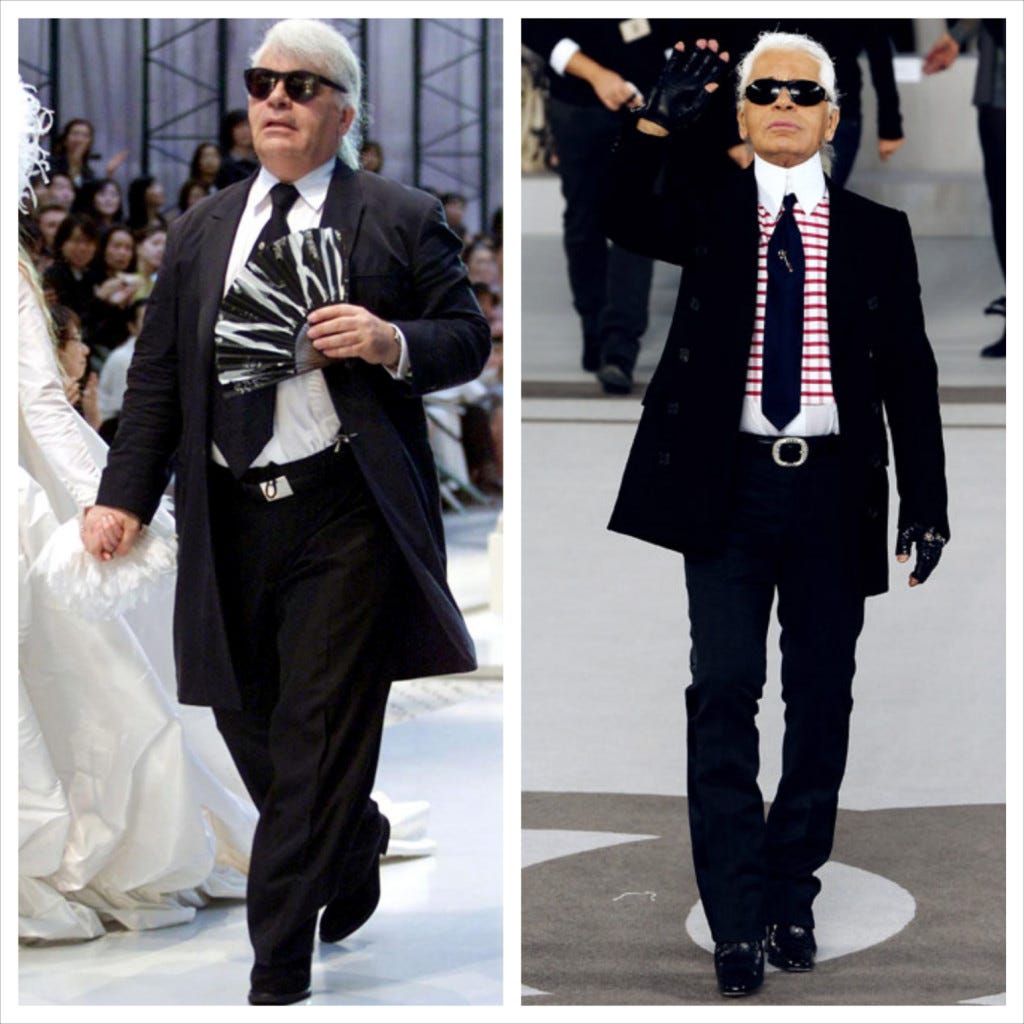
In any event, this past week, in celebration of 20 hours of food-sobriety, I did something I rarely do, and took myself off to a Chinese buffet, an experience by turns exhilarating, disappointing, disgusting and shameful.
As a food snob I’m a failure.
For me, as for Stalin, quantity has a quality all its own, which is to say that occasionally (more often than not, according to my wife) I prefer heaps of greasy peasant food to a single perfect molecule of eau d’potato swaddled in an insouciant Tuscan fig foam with an amuse-bouche of sous vide lamb’s tongue delicately balanced on deconstructed kohlrabi crostini…
When presented with such descriptions of fancy food, my first response is often, “give it a rest, Ferran-You-Ain’t”.
To come through the front door of the average strip mall Chinese buffet is to enter a world of wonder and promise, from the golden plastic Buddha to the plastic, red-dragon-spangled decor, the exotic orient beckons the unwary.
Such were the thoughts that occupied my mind as I slid through the entrance of the Hibachi Golden Grand Asian Buffet, a fantasy land of fried food from ingredients of unknown provenance. None of that “farm-to-table” blather at this establishment, just stingy bits of dodgy meat battered in something-or-other, fried in an oleaginous substance possibly derived from nature, and smothered in an orange sucrose sauce compiled in a factory in Guangzhou and shipped to America in a waxed cardboard tube hidden inside a crate of iPhones.
In other words, molecular gastronomy for the common man.
Inside, I was greeted and seated at table distant from the food. I was not the fattest man in the restaurant, that title belonging to a 400 pounder in a pair of too-tight Dockers and blue polo shirt.
“Thank goodness,” I thought, “the pressure is off,” and then, aloud to the waitress, “I’ll have a Diet Coke, please.”
I have vowed to not “drink my calories,” exceptions made for an evening glass of red or anything dispensed from a keg with a wooden spigot.
As the waitress went off to retrieve my drink, I stood up, aimed myself at the buffet, and….
RELEASE THE KRAKEN!
It’s easy, especially if you’re somewhat tallish and large-bodied, as I am, to imagine yourself as Godzilla, grabbing up random things — egg rolls, fishing boats, pork dumplings, Tokyo office towers — and snapping them with your jaws, the crumbs of buildings and chicken parts falling onto the dun-colored carpet below.
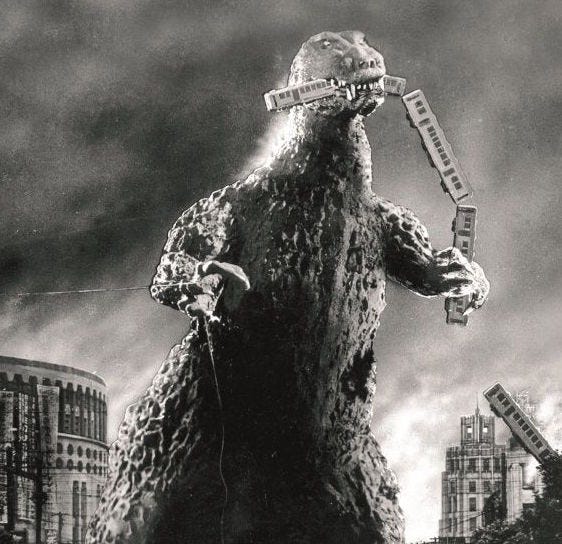
This is why I try to restrain myself: no eating while standing, no more than two full plates carried back at once on the first pass. I have a strategy and rules for dealing with an Asian buffet, one that naturally differs from my strategy and rules for dealing with, say, a Thanksgiving buffet, or a dessert buffet. At the Chinese buffet, I go for the appetizers first, egg rolls, pot stickers, crab rangoons. Although, also like most gluttons and Godzillas, I’m easily diverted from that plan, picking up things I shouldn’t simply because they’ve caught my attention.
For example, I’m distracted by the recent addition of sushi to the Chinese buffet repertoire. I like good sushi very much, almost as much as I dislike bad sushi, and invariably, in a triumph of hope over expectations, I now grab a few pieces of Chinese buffet sushi on that first trip.
This always ends in tears.
One would think that a decent California roll could be produced by anyone, its ingredients — rice, nori, sliced avocado and crab-stick — being standardized and universally available. Unfortunately this is not the case at most places, and certainly not the case at Hibachi, where the few pieces of sushi I tasted were soggy and stale and poorly made.
And that brings me to the ultimate and obvious point, most of the food is crap.
It’s not just the sushi that’s unpalatable, it’s almost everything. The sweet dishes are sweet beyond tolerance and the things that should be spicy are not. Gloopy, sticky, sweet and soggy. Almost nothing satisfies, or pleases, or makes me think I’d enjoy another helping.
I’ve eaten good Chinese food, at noodle joints and dim sum palaces in Monterey Park, San Francisco and New York City; places where the chefs are straight off the plane from China; places, where the food makes you want to go back and eat the same thing again every day for a month.
This have never happened to me at a Chinese buffet. Worse that that, eating at a Chinese buffet often puts me off eating for a few days, makes me believe I have better things to do with my time than think about what’s for dinner.
It’s a matter of expectations dashed. One enters the buffet in a state of heightened anticipation. We’re expecting a feast, a celebration. Gluttony means fun! We overeat at Thanksgiving and Christmas with family and friends and laughter and love. Or, in a good restaurant, we order more than we can eat and drink, because the food and fellowship satisfy us, and the luxury of the meal and our full bellies are proof that we have briefly lived well.
But, because so much of what is served at a Chinese buffet is of such poor quality, and because I am tempted to overeat so terribly to mask my disappointment, the ultimate effect is regret and sadness and shame.
The worst part is that I know this will happen even before I go into the Chinese buffet. But apparently I have to be reminded of this about once a year.
N.B. Since I wrote this piece, more than six years ago, I’m sad to say that I have never learned this lesson for very long.
Follow me on twitter, like on Facebook, and subscribe if you haven’t already. Cheers!

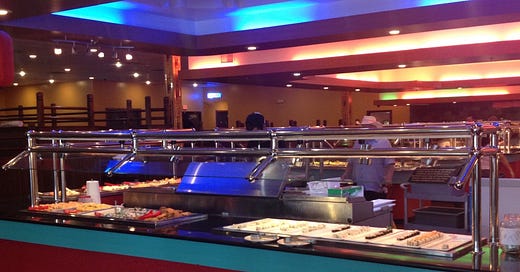



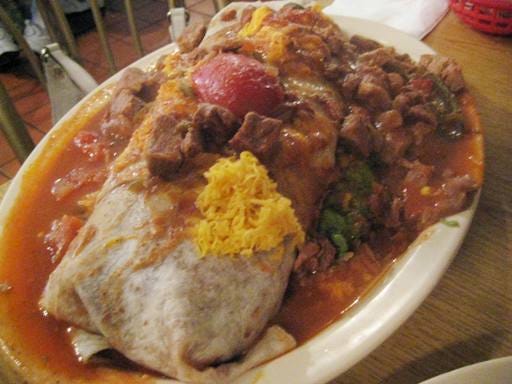




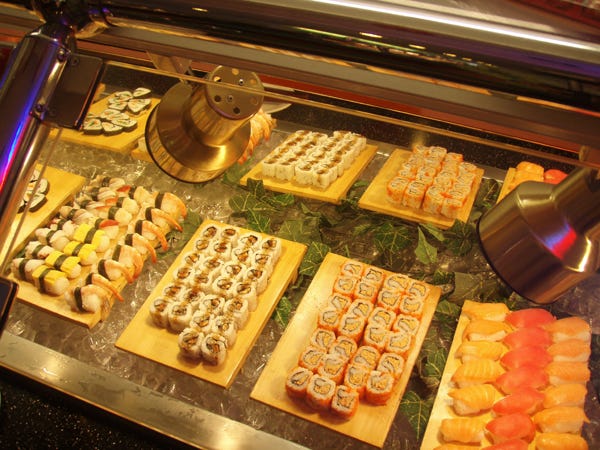
Sadly, this only made me hungrier.
H.D., you are an absolute legend. I’ve never read anyone who can articulate the joys (and often regret) of excessive eating like you can.